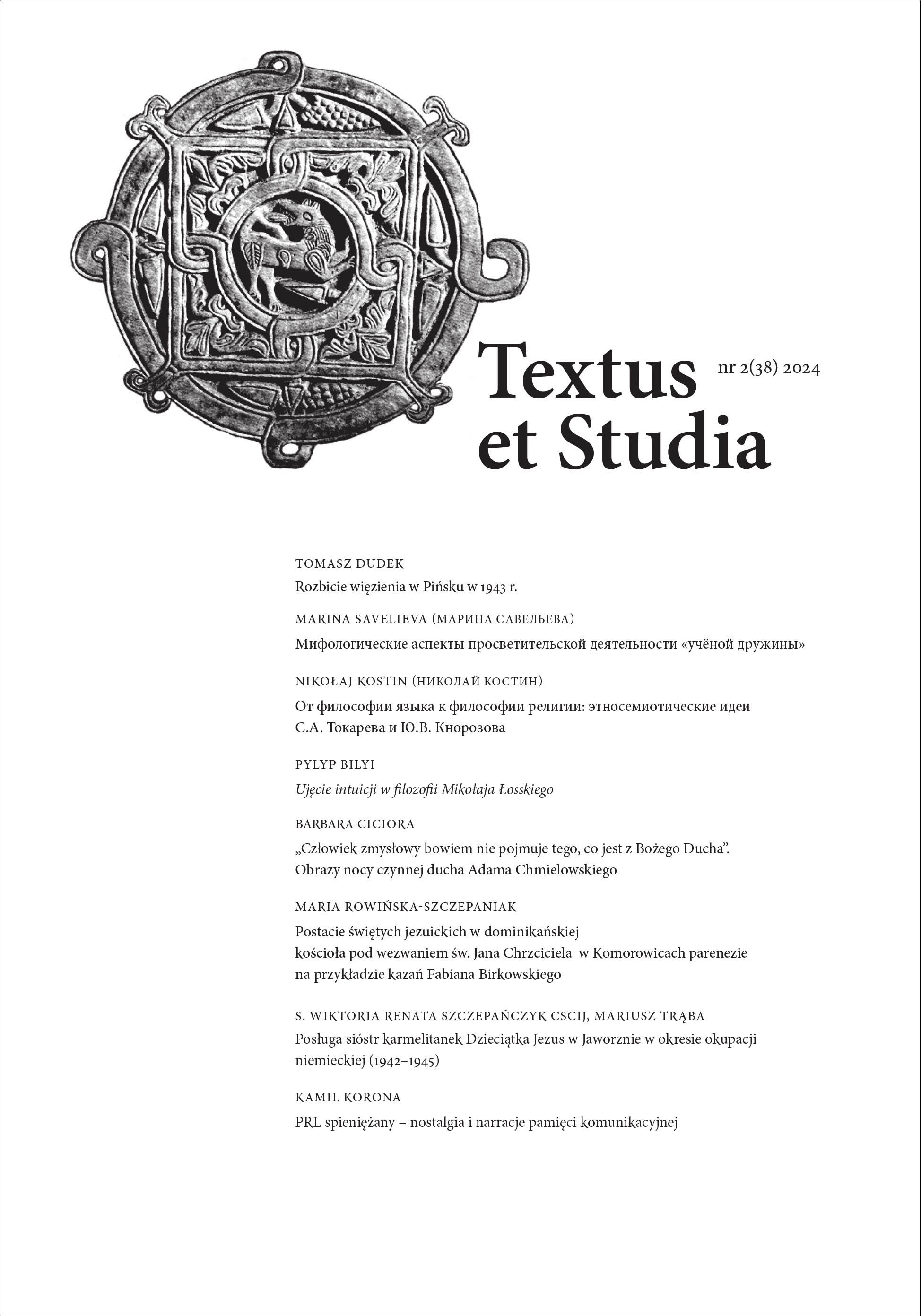PRL monetized – nostalgia and communication memory narratives
DOI:
https://doi.org/10.15633/tes.10208Keywords:
communicative memory, Polish popculture, Polish cinema, nostalgia, Polish society, 1970s, 1980s, People’s Republic of PolandAbstract
The communist period (especially the 1970s and 1980s) was a time of great economic difficulties for Poland. In the cultural sphere, the country, which belonged to the Eastern Bloc, was strictly controlled by the party authorities and censorship. However, people felt they wanted something different – mainly Western goods. American pop culture infiltrated through the Iron Curtain, sparking the imagination of Eastern Bloc residents, who tried in various ways to learn about it and translate it into familiar realities. About 45 years have passed since then. The People’s Republic of Poland and memorabilia from that period are beginning to be increasingly the subject of online auctions and collectors’ interest. In the entertainment sector, films are being made that treat this time as an interesting and as yet unexploited matrix for telling stories that are more or less true. The effects of Americanization and the modern capitalist mentality are slowly mixing with the communicative memory which, in the end, opens the way for monetizing nostalgia.
References
Burszta W., Jawor A., Pęczak M., Rauszer M., Zańko P., Etnografia pamięci PRL-u. Kultura codzienności Polski powojennej 1956–1989, Warszawa 2021.
Carr D., Narrative and the Real World: An Argument for Continuity, „History and Theory”, 2/25 (1986), s. 117–131.
Filek-Marszałek H., Marszałek, ten od Reksia, Poznań 2022.
Fortuna G., Rynek wideo w Polsce, „Images”, 13/22 (2013).
Guffey E.E., Retro: The culture of revival, London 2006.
Idzikowska-Czubaj A., Rock w PRL-u. O paradoksach współistnienia, Poznań 2011.
Jarnuszkiewicz M., Retro: czyli o przedmiotach w czasie i narracji, „Fragile. Pismo Kulturalne”, 4/46 (2019).
Kamińska M., Jeśli to pamiętasz, to pewnie już nie żyjesz [w:] Pomiędzy retro a retromanią, M. Major, P. Włodek (red.), Gdańsk 2018, s. 11–36.
Koziczyński B., 333 popkultowe rzeczy… PRL, Poznań 2007.
Księżyk R., Dzika rzecz: polska muzyka i transformacja 1989–1993, Wołowiec 2020.
Lee H.K., Beyond “imagined” nostalgia: Gunsan’s heritagization of Japanese colonial architecture in South Korea, „International Journal of Asian Studies”, (2021).
Napiórkowski M., Mitologia współczesna, Warszawa 2018.
Piechota D., Na fali nostalgii, Kraków 2022.
Pomiędzy retro a retromanią, M. Major, P. Włodek (red.), Gdańsk 2018.
Trzciński S., Zarażeni dźwiękiem. Rynek muzyczny w czasach sztucznej inteligencji, Warszawa 2023.
Tyrmand L., Cywilizacja komunizmu, Warszawa 2001.
Upton B., Hollywood and the End of the Cold War: Signs of Cinematic Change, Londyn 2014.
Netografia
Bigringcycling, 80s on Netflix vs 80s IRL…, https://www.reddit.com/r/WhitePeopleTwitter/comments/rcl0dk/80s_on_netflix_vs_80s_irl/ [dostęp: 10.03.2024].
Ferguson G., The American Dream is Dead. Unless You Leave America, https://greysonferguson.medium.com/the-american-dream-is-dead-unless-you-leave-america-bd3081010f79 [dostęp: 10.03.2024].
https://allegro.pl/oferta/odtwarzacz-kasetowy-ps-101-kajtek-unitra-zrk-w-oryginalnym-opakowaniu-15347050991 [dostęp: 23.03.2024].
https://allegrolokalnie.pl/oferta/ruska-gierka-gra-elektronika-prl-jajeczka-zsrr [dostęp: 23.03.2024].
https://www.olx.pl/d/oferta/gra-jajeczka-elektronika-prl-CID88-IDTAMW1.html?reason=extended_search_extended_category [dostęp: 23.03.2024].
SpoilerMaster || Podcast do słuchania po seansie, #SpoilerMaster S03E09: Kultura VHS & lata 1990-te (gość: Grzegorz Fortuna), https://www.youtube.com/watch?v=ajGqqgke45Y [dostęp: 15.03.2024].
Staszczyszyn B., Misjonarze są zmęczeni – polskie kino popularne lat 80., https://culture.pl/pl/artykul/misjonarze-sa-zmeczeni-polskie-kino-popularne-lat-80 [dostęp: 15.03.2024].
Walkiewicz M., Coś z niczego, https://www.filmweb.pl/reviews/recenzja-filmu-Zupa+nic-23972 [dostęp: 23.03.2024].
Filmografia
Autsajder, reż. A. Sikora, Polska 2018.
Bogowie, reż. Ł. Palkowski, Polska 2014.
Czerwony pająk, reż. M. Koszałka, Polska 2015.
Doppelgänger. Sobowtór, reż. J. Holubek, Polska 2023.
Ikar. Legenda Mietka Kosza, reż. M. Pieprzyca, Polska 2019.
Jestem mordercą, reż. M. Pieprzyca, Polska 2016.
Karate po polsku, reż. W. Wójcik, Polska 1982.
Kraina doliny węży, reż. M. Piestrak, Polska 1987.
Najmro. Kocha, kradnie, szanuje, reż. M. Rakowicz, Polska 2021.
Ostatnia rodzina, reż. J. P. Matuszyński, Polska 2016.
Pod każdą strzechą, reż. K.P. Łepkowski, Polska 1988.
Rojst, Polska 2018–2024.
Seksmisja, reż. J. Machulski, Polska 1983.
Stranger Things, reż. M. Duffer, R. Duffer, USA 2016–.
Sztuka kochania. Historia Michaliny Wisłockiej, reż. M. Sadowska, Polska 2017.
Va Bank, reż. J. Machulski, Polska 1981.
Wałęsa. Człowiek z nadziei, reż. A. Wajda, Polska 2013.
Zupa nic, reż. K. Dębska, Polska 2021.
Żeby nie było śladów, reż. J.P. Matuszyński, Polska–Czechy–Francja 2021.
Downloads
Published
Issue
Section
License

This work is licensed under a Creative Commons Attribution 4.0 International License.
Authors who publish with this journal agree to the following terms:
- Authors retain the copyright and full publishing rights without restrictions, and grant the journal right of first publication with the work simultaneously licensed under a Creative Commons Attribution 4.0 International License that allows others to share the work with an acknowledgement of the work's authorship and initial publication in this journal.
- Authors are able to enter into separate, additional contractual arrangements for the non-exclusive distribution of the journal's published version of the work (e.g., post it to an institutional repository or publish it in a book), with an acknowledgement of its initial publication in this journal.
- Authors are permitted and encouraged to post their work online (e.g., in institutional repositories or on their website) prior to and during the submission process, as it can lead to productive exchanges, as well as earlier and greater citation of published work (See The Effect of Open Access).

